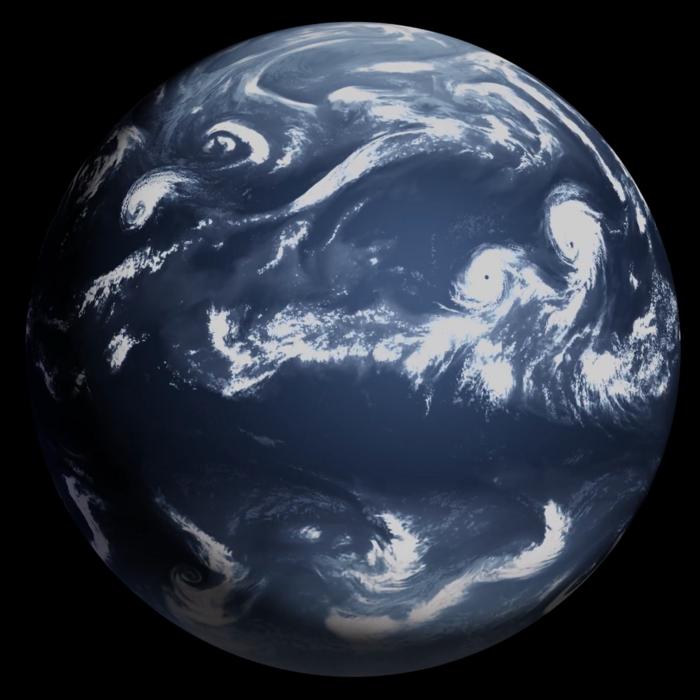More accurately predicting periods of increased hurricane activity weeks in advance may become possible due to new research published this month.

Credit: University Corporation for Atmospheric Research (UCAR).
More accurately predicting periods of increased hurricane activity weeks in advance may become possible due to new research published this month.
The study, led by the U.S. National Science Foundation National Center for Atmospheric Research (NSF NCAR), shows that twice as many hurricanes form two days after the passing of large-scale atmospheric waves called Kelvin waves than in the days before. This finding may enable forecasters and emergency managers to anticipate clusters of hurricanes days to weeks in advance.
The research team used an innovative computer modeling approach to tease out the influence of Kelvin waves, which are large-scale atmospheric waves that can extend more than 1,000 miles in the atmosphere and shape global weather patterns.
“If weather forecasters can detect a Kelvin wave over the Pacific Ocean, for example, then they can anticipate that a few days after the wave there will be an uptick in hurricanes forming over the Atlantic,” said NSF NCAR scientist Rosimar Rios-Berrios, the lead author of the paper. “This would help them communicate with emergency managers and local governments who could prepare for the likelihood of an active hurricane period and alert the public. This research has the potential to save many lives.”
The study was published in Monthly Weather Review.
Aquaplanet
For decades, scientists have noticed that hurricanes form in clusters followed by several weeks of little to no hurricane activity. Several studies have suggested that Kelvin waves could be responsible for the surge in hurricanes, but scientists were unable to separate out other potential factors and prove Kelvin waves were responsible. To overcome this, Rios-Berrios and her colleagues used a novel combination of computer modeling tools to confirm that Kelvin waves do indeed boost hurricane formation.
The research team used a simulation called aquaplanet that was run on NSF NCAR’s Model for Prediction Across Scales (MPAS), which is a next-generation computer model that can capture fine-scale weather phenomena and global-scale atmospheric patterns simultaneously. Aquaplanet is a configuration that simulates a hypothetical world that behaves like Earth, but doesn’t have land or seasons. The simplified world acts like a lab and makes it easier to isolate the effects of Kelvin waves on hurricane formation.
The scientists ran the simulations on the Cheyenne supercomputer at the NCAR-Wyoming Supercomputing Center.
To investigate the connection between Kelvin waves and hurricanes, the research team measured the number of days between hurricane formation and Kelvin wave crests. The measurements showed a significant peak after two days, with hurricane development being twice as likely. Because the aquaplanet simulations capture the physical process of hurricane formation, the results go beyond correlation and suggest that Kelvin waves are actually impacting hurricane formation.
The new study also emphasizes the importance of recent research that Rios-Berrios co-authored with NSF NCAR postdoc Quinton Lawton about the need to improve the ability of weather forecast models to simulate Kelvin waves.
“I started this research on Kelvin waves in 2017. It was a big project that took years to go from an idea to scientific results and really highlights why this type of research is so valuable,” said Rios-Berrios. “There are still a lot of gaps in scientific knowledge about how hurricanes form and research like this helps us narrow where scientists should focus to better understand these powerful storms.”
About the article:
Title: Modulation of tropical cyclogenesis by convectively coupled Kelvin waves
Authors: Rosimar Rios-Berrios, Brian Tang, Christopher Davis, and Jonathan Martinez
Journal: Monthly Weather Review
Web | X | Instagram | Facebook
This material is based upon work supported by the NSF National Center for Atmospheric Research, a major facility sponsored by the U.S. National Science Foundation and managed by the University Corporation for Atmospheric Research. Any opinions, findings and conclusions or recommendations expressed in this material do not necessarily reflect the views of NSF.
Journal
Monthly Weather Review
Method of Research
Computational simulation/modeling
Article Title
Modulation of Tropical Cyclogenesis by Convectively Coupled Kelvin Waves
Article Publication Date
1-Aug-2024



